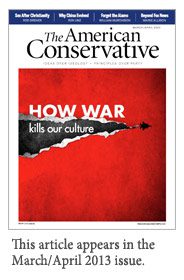Look Homeward, Devil

Thomas Wolfe, the adjectival Tar Heel, not the dandified Virginia expositor of The Right Stuff, philosophized in his execrably titled You Can’t Go Home Again that “A man learns a great deal about life from writing and publishing a book.”
He can say that again… and again.
(I’ll always love Wolfe, who meant a great deal to me when I was younger, but one of my favorite stories about the logorrheic author is that he prefaced the manuscript that became Look Homeward, Angel with an assurance that “I do not believe the writing to be wordy, prolix, or redundant.”)
March 2013 marks the tenth anniversary of the simultaneous launching of the Iraq War and my memoirish tale of going home again (and what I found there), Dispatches From the Muckdog Gazette.
I guess there just wasn’t enough space in the American attention span to accommodate both these events, so despite the best efforts of the good folks at Henry Holt, shock and awe hogged all the headlines. Those bastards Bush and Cheney—what infernal timing they have!
I did, however, learn a bit about life from that experience.
Honesty is not just the best but the only policy for a writer. As Thoreau counseled, “Say what you have to say, not what you ought. Any truth is better than make-believe.” Given that this book’s subject was my hometown of Batavia, New York, there was no way to be honest without bruising feelings. To have been cautious or solicitous would have caused severe anemia and crashing boredom.
A month or so before publication I came down with the usual auctorial premonitions of disaster. There was a good deal of anticipation around town surrounding publication, to which my reaction was “Holy Crow—people here are actually going to read this.” What, I wondered, was the modern equivalent of being run out of town on a rail?
For in Dispatches, I treated with wit (half-wit, if you don’t like it) and gleeful scatter-sprayed invective the ethno-religious conflicts that once rived—and, in a way, fortified—my town. As a typical American mongrel, with mixed bloodlines and a shambling sympathy for all sides of the American divide, I claimed an exemption from oppressive sensitivity codes. I wrote about the faded WASP ruling class from the point of view of the once déclassé Italian and Irish Catholics, and I wrote about the latter from the p.o.v. of the former. After all, I’m dago, mick, limey, kraut, papist, Prot… that’s a pretty wide free-fire zone.
Wolfe described “with bitter chagrin” the reception of Look Homeward, Angel by his hometown of Asheville, North Carolina. The vitriol fell like acid rain. But then Wolfe had fled North Carolina for exile in the Vampire City.
He wrote of a tormentor: “One venerable old lady, whom I had known all my life, wrote me that although she had never believed in lynch law, she would do nothing to prevent a mob from dragging my ‘big overgroan karkus’ across the public square.”
I heard through the grapevine of—mercifully few—people who were offended by my Italian jokes. (My Stella lineage provided insufficient protection—but then my grandmother always said we were “northern Italian, almost Swiss.”) From the other side, I was taken to task by the octogenarian grande dame of our city, who had grown up in pre-sprawl Long Island and still sounded like it.
She confronted me after a concert at St. James Episcopal Church. “I’m baaah-lee speaking to you,” she announced.
Wolfe-like, I had known my venerable critic since I was a boy. I threw my hands up in mock surrender.
“Sorry… sorry,” I stammered, certain that I knew the source of her displeasure: my raillery about upper-crust Protestants.
“How could you say that I have an ox-cent?” she asked in her inimitable accent.
I laughed. “Is that all?”
 “Yes. And why must you use so much profanity?”
“Yes. And why must you use so much profanity?”
I acknowledged my literary Tourette’s. Within the month she was speaking to me again. As I write this she is 92 and we’re still pals.
Various outlets sold upwards of 800 copies of the book in Batavia—an extraordinary number for a rural working-class burg of 15,000 souls. As for sales in the rest of the good old USA… I blame Bush.
I had used as an epigraph this line from Sinclair Lewis’s Cass Timberlane: “To its fugitive children, Grand Republic will forgive almost anything, if they will but come back home.”
You can go home again. And if they’ll forgive me, they’ll forgive anyone.
Comments